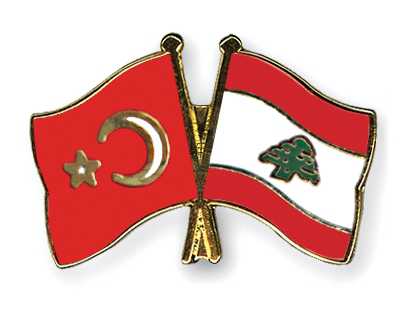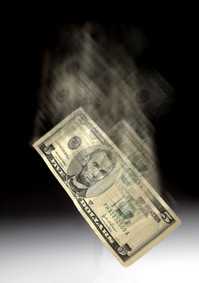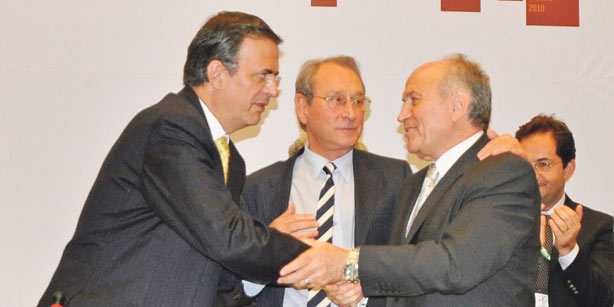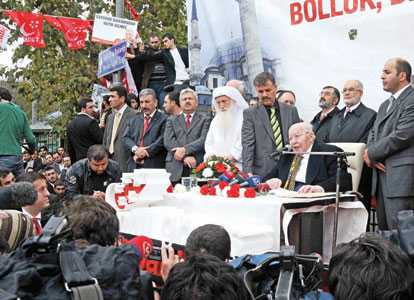Henri J. Barkey
Q&A, NOVEMBER 17, 2010
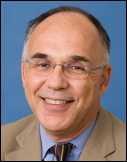 With economic success at home, Turkey’s government has been flexing its muscles on the world stage and Recep Tayyip Erdogan seems likely to win a third term as prime minister next year. As Turkey moves toward national elections in 2011, analysts are questioning whether Erdogan’s demonstrated popularity will further embolden an increasingly assertive foreign policy or if a more democratic Turkey will find ways to reduce friction with the West.
With economic success at home, Turkey’s government has been flexing its muscles on the world stage and Recep Tayyip Erdogan seems likely to win a third term as prime minister next year. As Turkey moves toward national elections in 2011, analysts are questioning whether Erdogan’s demonstrated popularity will further embolden an increasingly assertive foreign policy or if a more democratic Turkey will find ways to reduce friction with the West.
In a Q&A, Henri Barkey analyzes how Turkish politics influence the country’s rise. Barkey says that the ruling party is now well positioned for the election and that a convincing victory could create the momentum necessary to redraft the constitution. Through sheer ambition, popularity, and political savvy, Erdogan has come to dominate Turkey in all its facets—domestic, foreign, and security. He has become the master tactician and Turkey’s single most determinant force. While the West is concerned that Turkey will continue its assertive foreign policy, it remains to be seen whether Erdogan’s domestic popularity may actually temper his populist rhetoric and policies.
What are the major issues in the national elections next year?
A major test for the ruling Justice and Development Party (AKP) and opposition parties was the referendum in September—the results constituted a significant defeat for the opposition. The main opposition party, the Republican People’s Party, elected a new leader just a few months before the referendum. While the party’s strategy was developed before he took the reins, he fared poorly in his first electoral test. And nearly half of the supporters of second largest opposition group, the nationalist National Movement Party, defected to the AKP.
The Kurdish party, the Peace and Democracy Party, on the other hand, also emerged a winner in the referendum. Despite doubts that the strategy would be effective, the party called for a boycott of the referendum to protest that none of the proposed changes would improve the Kurds’ situation. Again to the surprise of many, most of its voters heeded the party’s call. With the possibility that the constitution will be completely redrawn starting next year, Kurds may continue to rally around the party in the elections in hopes of presenting a united front on Kurdish demands.
The opposition’s decision to turn the referendum into a vote on the AKP—a major strategic error—leaves the AKP in great shape for the elections slated for next summer. And if the current projections hold, the government will be in a good position to deal with Turkey’s unresolved internal issues—including the Kurdish question—and rewrite the constitution.
Turkey’s strong economic performance has helped improve the AKP’s popularity as the ruling party is widely credited for its market-friendly policies. While there is unemployment in Turkey, the country managed the global crisis better than most and enjoys excellent economic prospects compared to the rest of the world. The opposition has yet to put forward a distinct and viable economic program with which it can dent the AKP’s commanding lead among voters reluctant to upset the current momentum. For the time being, the opposition is not giving the population reasons to support it. The Republican People’s Party, however, is in the midst of an attempted revival and cleansing of its most conservative elements. Whether the new leadership succeeds in injecting new blood and ideas will be critical to ending, in the medium term, the current one-party dominance of Turkish politics.
The one major issue that could alter the trajectory of the elections is the Kurdish question. While the AKP is not going to make any significant changes or offer proposals on the Kurdish issue before next year’s vote, it clearly wants to contain interethnic violence. There will undoubtedly be attempts to provoke fighting by all kinds of provocateurs intent on derailing the prospect of a peaceful solution. The government will need to show restraint and carefully manage the situation.
That Erdogan ultimately wants to be president is the open secret that everyone in Turkey is talking about. Currently, the president is selected by the parliament, but due to an amendment introduced some years ago, the next president will be selected by popular vote. Erdogan is thought to be interested in replacing the current Turkish parliamentary system—which concentrates all executive power in the hands of the parliament and its chosen cabinet—with a presidential system of sorts. To succeed, however, he must win the next election as convincingly as possible. A strong AKP victory will open the door for constitutional reform and Erdogan’s goal of becoming president with expanded powers.
A presidential system is not a foregone conclusion, however. There is likely to be a great deal of opposition from within the AKP to such a radical change in the constitution—particularly as it could diminish the importance of the party itself. Hence it is expected that Erdogan will try to carefully select future candidates for parliament with an eye on their willingness to ultimately support such revisions.
What was the significance of the September referendum?
The constitutional amendments voted on in September aim to further erode the military’s political influence and restructure the judiciary. The reforms include barring military courts from trying civilians, empowering civilian courts to try military figures for plotting to overthrow the government, and lifting immunity for the perpetrators of the 1980 military coup. In addition, there are provisions giving workers more labor union choices and allowing them to join more than one and adding new protections for women, children, the elderly, and the disabled.
Notably, changes were also made to the membership of the Constitutional Court and the High Judicial Council, which regulates judges and prosecutors. The changes are the direct result of the confrontation between the AKP and the judiciary, one of the bulwarks of the Kemalist regime in Turkey. Frustrated by its inability to dent the judiciary’s control—which derived primarily from the way judges and prosecutors were selected from a small coterie of ideological purist elements—the AKP pushed to widen the selection process and enlarge the main constitutional judicial bodies. One of the primary outcomes has been to give more say to the parliament in selecting membership. The number of seats on the constitutional court, for instance, was increased from 11 to 17. Ironically, the strongest bulwark to changing the constitution is the constitutional court itself which, in the past, has invoked its own interpretation of the immutable articles of the constitution, forbidding women wearing headscarves from attending university or simply manufacturing criteria to prevent a presidential candidate from getting elected.
All these provisions, however, are relatively minor and represent a tiny step toward serious reform. AKP’s timid constitutional gambit had more to do with its electoral ambitions and dominating the political discourse than changing the constitution. Turkey is in desperate need of a new constitution that brings the country more in line with Western models in Europe and the United States. The current constitution is a straightjacket that privileges the state over the individual. Turkey is a country of laws, but not the rule of law—laws are applied in an arbitrary fashion; it is not the infraction of the law that determines whether an individual is to be charged but that individual’s position in society. And laws have always been applied harshly to deal with opponents of the regime. Shortly after the results of the referendum were released, Erdogan committed to pushing for a complete overhaul of the current constitution—imposed by the military after the 1980 coup—after next year’s election.
While the referendum was specifically about all of these issues, in the end, the vote was more about the AKP. The 58-42 percent result surprised everyone as most observers had expected a tighter outcome. The opposition made a strategic calculation that discussing the individual reforms would be too difficult, so it erred on the side of the uncomplicated and decided to make the AKP the issue instead—and this backfired. Since the margin in favor of the amendments was even larger than predicted, the AKP emerged stronger ahead of next year’s elections and the opposition appears feeble.
Is there a divide between the secular establishment and religious-leaning government in Turkey?
The impression one gets about the division between secularists and Islamists in Turkey is misleading. Today, the fight is over Kemalism, the official ideology of the state, named after the founder and first president of the Republic of Turkey, Mustafa Kemal Ataturk.
Dominating Turkey since the 1930s, the ideology is nationalistic, self-reliant, xenophobic, and adamantly secular. Its problems have been mostly associated with the narrow and forcible way in which it was introduced and implemented over the years. But shortcomings aside, it has also fast-tracked the emancipation of women and has, even if indirectly, wedded Turkey to the West. Adamant supporters of Kemalism include the military, judiciary, universities, media, and some of the upper-middle class.
The problem with Kemalism is not necessarily its ideological components, but how its supporters operationalize it on a day-to-day basis. The 1930s ideology was rendered amazingly rigid by its original supporters, who were often inflexible, undemocratic, and intolerant of others. In many ways, the military, which took the lead in interpreting Kemal’s legacy, viewed everything through a narrow prism of internal security where everyone was a potential suspect and traitor. The lack of trust in its population is exactly the opposite of all liberal, Western constitutions. Successive constitutions and the political system constructed around this legacy have stunted democratic development in Turkey.
The September referendum is the beginning of the dismantlement of the ideological infrastructure of the Turkish state. The next step is to change the constitution, and whether the AKP will be successful in doing this remains an open question. But if it does not, the AKP will likely fill the authoritarian vacuum left by the retreating Kemalists. At the moment, there is too much power vested in Erdogan—precisely because he is so popular. The inherent authoritarian tendencies in the current political system that privileges party leaders and turns them into demi-gods is not conducive to democratic institutionalization.
As they consider a new constitution, the AKP and Erdogan have much to decide on balancing the expansion of rights for those with whom they disagree. This ranges from expanding the rights of those who have been marginalized by the current system while protecting the rights of persons who find themselves at odds with the AKP’s priorities—such as the traditional secular elites who fear that their way of life is under assault—to guaranteeing freedom of the press, irrespective of how unlikeable their owners may be in the eyes of the government.
How is Ankara handling the domestic Kurdish issue?
To its credit, the AKP launched the Kurdish opening—an attempt to solve a 26-year insurgency through political, cultural, and economic means rather than just military force—last year. But in the face of a domestic backlash and upcoming referendum and elections, the government backtracked and closed the door, at least temporarily. The hope is that with a strong electoral mandate, the AKP will finally take the steps necessary to resolve the issue.
Turkey is deeply divided over its Kurdish minority—which totals approximately 20 percent of the population—and moving toward a crisis point. The violent struggle for greater rights has been led by the Kurdistan Workers’ Party (PKK) and enjoys a great deal of support among Kurds. The situation is also evolving as the Kurdish population is no longer concentrated in the southeast, but spread across the country. There are as many as 3 million to 5 million Kurds in Istanbul alone, making it the world’s largest Kurdish city. This means the frustration is not contained to a certain region and conflict could erupt anywhere. Youth, in particular, feel alienated and are prone to violence.
The state has been unable to contain the struggle through security and military efforts. Kurdish leaders want official recognition for the ethnic group, cultural freedom, language rights, and a greater devolution of administrative powers in Turkey. The only way to truly address the issue is through constitutional change. This will mean that certain articles in the constitution that explicitly define Turkey as an ethnic state will need to be altered, the decision-making authority of local leaders will need to be strengthened, and the right to teach, speak, and make use of the media in one’s mother tongue will need to be protected.
These changes cannot be seriously contemplated until after the elections—and this is assuming the AKP wins. Until then, there is a great deal of tension and the Kurds aren’t patiently waiting. In the absence of any response from the central government, they are quietly creating the institutions that are separate and autonomous, although they are not calling for independence.
How is Turkey’s rising regional influence shifting its foreign policy and international interests?
Turkey’s assertive foreign policy and increasing overtures to non-Western governments—most notably Iran, as seen most recently when Ankara sided with Tehran in the United Nations Security Council against the U.S. push for tougher sanctions—are driven by ambition and economic aspirations.
Turkey wants to be a regional power and a global player by using its geopolitical advantages, economic strength, and historical and cultural links with the Muslim world. Today it is the world’s sixteenth-largest economy and aims to be among the top ten economies by 2023. Turkey’s dynamism and its willingness to engage internationally have given it a great deal of clout. In part, the Erdogan government has an overinflated sense of its global relevance and this unhealthy dose of hubris pushes Ankara to go too far at times. Turkey punched well below its weight for a long time, but now it’s punching well above its weight.
Opening new markets, deepening existing ones, and making the most of all commercial opportunities are also driving Turkish foreign policy. Turkey’s economy is export-dependent and Turkish businesses look to the government to help them with new markets.
This can be seen even in the case of Iran. The last thing Turkey wants is another conflict along its borders—like in Iraq—because instability can disrupt trade relations. Moreover, Turkey has also parlayed its new clout to bolster its trade relations with everyone in the Middle East, including Iran. Despite international sanctions, Erdogan has sought to use its support for Iran at the UN Security Council to improve commercial relations, calling for a tripling of the mutual trade in the next five years.
How is Turkey’s relationship with Europe evolving?
It’s important to remember that it will take around 20 years or more for Turkey to be ready to join the European Union. The referendum in September was only one small step for Turkey on the road to membership but it by no means represents the major change Europe still expects. In addition to a new constitution and Turkey’s adherence to the Copenhagen criteria, Ankara also needs to solve its Kurdish question.
Sensitive and complex changes will not happen overnight and the tough road ahead should not be underestimated. This means that politics in Europe today are in many ways irrelevant to Turkey’s EU accession. French President Nicolas Sarkozy and, to a lesser extent, German Chancellor Angela Merkel may resist Turkey’s ambitions for European integration, but they won’t be in charge in 20 years.
Whatever the Europeans say today, if Turkey continues to reform, solves egregious problems, and changes its domestic politics to be more tolerant and to resist authoritarian tendencies that come naturally to government and party leaders—which in the past has led to, for instance, unacceptable pressure on the press, it will be extremely hard for Europe to say no in two decades—so long as the continent is not in the economic mess that it is now. So while Turks are prone to use European leaders’ lack of desire to justify inaction, the country should want to make the changes regardless and show the world it is serious about reform. Then when the time comes, if Turkey has successfully implemented the necessary reforms, Europe will have a hard time refusing Turkey’s accession.
If the AKP convincingly wins the next elections, as expected, it will have a real opportunity to start tackling the hard problems facing Turkey. This could be good news for democracy in Turkey and its move toward Europe.
What is the status of U.S.-Turkish relations?
There is a great deal of angst and reflection in the United States in terms of its relations with Turkey. Given Turkey’s more muscular role on global issues, there is a bit of a backlash in Washington. Policy makers are concerned that Turkey will drift toward the East and work against U.S. interests. In reality, Turkey is not going anywhere. Turkey’s current stature in the region would suffer greatly if it is perceived to have broken with Washington. Both countries need each other.
The problem is that they have difficulty communicating with and understanding each other. While the United States has to adjust to the reality of Turkey under the AKP, Ankara has to learn to deal with the United States, which, as a global power, has numerous interests in far-flung places and is not solely focused on Turkey’s region. The United States must accept Turkey’s domestic transformation and how that manifests itself in the bilateral relationship—the elites the United States were used to dealing with, like the Istanbul-based business sectors and the military, are no longer calling the shots. Instead a conservative, pious, and yet market-oriented elite from Anatolia has garnered the levers of power.
For their part, the Turks have always exhibited a primitive and conspiratorial approach to Washington, which has caused them to misunderstand and misinterpret American interests. The best example of this was during the recent crisis over Turkey and Brazil’s mediation efforts on Iran’s nuclear program, when Ankara completely misread the Obama administration’s concerns regarding counter-proliferation efforts, desire to reduce the number of nuclear weapons, and sign the START agreement with Russia.
There are concerns that with Erdogan and the AKP’s current domestic strength, Ankara will become even more aggressive internationally. But this could go both ways. An Erdogan who feels more secure will be more comfortable and relaxed going into the election, so the inclination to go for populist, nationalist, and flamboyant policies may diminish. Exacerbating relations with Washington will not help him—except with nationalist elements on the margins—because the time is quickly approaching when the Turkish electorate will look for a leadership that is less combative, more mature, and more constructive. That’s a good sign for U.S.-Turkey relations.
Still, there is no guarantee that the two sides will see eye to eye on all issues. Turkish-American relations were always difficult and acrimonious even in the best of times, and the State Department is used to relying on the Pentagon to wield its influence there. What is different now is that the issues over which Turkey and America differ are far more numerous and complicated than in the past.
, NOVEMBER 17, 2010
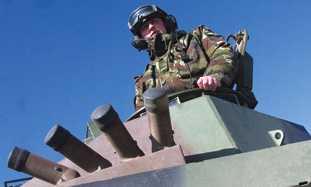 In mid-November, the world media reported that Interpol was hunting for seven members of an organ-trafficking ring. They were accused of operating a clinic called Medicus in Pristina, the capital of Kosovo. Most news media were excited to reveal that two Israelis were among those named in the 46-page Interpol report. Less interest was shown in the other international members of the ring – Turkish and Albanian Muslims.
In mid-November, the world media reported that Interpol was hunting for seven members of an organ-trafficking ring. They were accused of operating a clinic called Medicus in Pristina, the capital of Kosovo. Most news media were excited to reveal that two Israelis were among those named in the 46-page Interpol report. Less interest was shown in the other international members of the ring – Turkish and Albanian Muslims.
